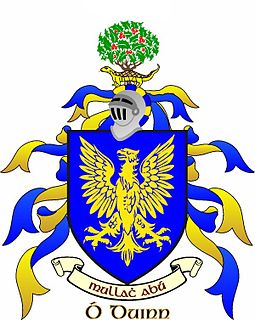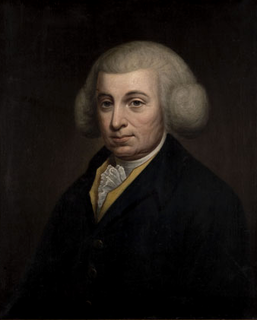Edwin O'Connor was an American journalist, novelist, and radio commentator. He won the Pulitzer Prize for Fiction in 1962 for his novel The Edge of Sadness (1961). His ancestry was Irish, and his novels concerned the Irish-American experience and often dealt with the lives of politicians and priests.
Events from the year 1909 in Ireland.
Matthew O'Conor Don of Ballinagare, County Roscommon, Ireland was an Irish historian, the O'Conor Don and de jure King of Connacht.
Conor is a male given name of Irish origin. The meaning of the name is "Lover of Wolves" or "Lover of Hounds". Conchobhar/Conchubhar or from the name Conaire, found in Irish legend as the name of the high king Conaire Mór and other heroes. It is popular in the English-speaking world. Conor has recently become a popular name in North America and in Great Britain. Some alternative spellings for the name are often spelled Connor, Conner and sometimes Konnor.
O'Conor, is an Irish aristocratic house and former royal line of Gaelic leaders, which included many historic Kings of Connacht and the last High Kings of Ireland. The family seat is Clonalis House outside Castlerea in County Roscommon.

Dunne is an Irish surname, derived from the Irish Ó Duinn and Ó Doinn, meaning "dark" or "brown." The name Dunne in Ireland is derived from the Ó Duinn and the Ó Doinn Gaelic septs who were based in County Laois, County Meath and County Wicklow. These septs in turn are descendants of the O'Regan noble family. It is in these counties that the majority of descendants can still be found. Hundreds of years ago, the Gaelic name used by the Dunn family in Ireland was Ó Duinn or Ó Doinn. Both Gaelic names are derived from the Gaelic word donn, which means "brown". Ó Doinn is the genitive case of donn. First found in county Meath, where they held a family seat from very ancient times. Variations: Dunn, Dunne, Dun, Duen, O'Dunne, O'Doyne, Doine, Doin, O'Dunn.
O'Farrell is a surname of Irish Gaelic origin. Bearers include:

O'Cleary is the surname of a learned Gaelic Irish family. It is the oldest recorded surname in Europe — dating back to 916 CE — and is cognate with cleric and clerk. The O'Clearys are a sept of the Uí Fiachrach dynasty, who ruled the Kingdom of Connacht for nearly two millennia. As Connachta, the O'Cleary's ruled the kingdom of Uí Fiachrach Aidhne for nearly 800 years. They are the descendants of Fiachrae, son of the High King Eochaid Mugmedon, and elder brother of legendary High King Niall of the Nine Hostages. According to legend, they ultimately trace their ancestry back to the mythical Fir Bolg, as well as to Milesius, and consequently to Japheth, son of Noah.
John O'Connor may refer to:
Duffy is a surname of Irish origin that comes from the original Irish name Ó Dubhthaigh, meaning descendant or grandson of Dubhthach. Dubhthach was an Old Irish first name meaning "Black". The name also has connotations derived from Spain, Latin America and Italy. Variations include: Duffey, Duffee, Duff, O'Duffey, O'Duffy, Duffe, O'Duffe, Dufficy, Doey, Dohey, Doohey, Duhig and O'Dowey. The name originates from Connacht. It may refer to:
O'Connell is a last name of Irish origin. It is an Anglicisation of the Gaelic Ó Conaill. The personal name Conall is possibly composed of the elements con and gal.
John or Johnny Power may refer to:
Thomas O'Connor may refer to:
Flanagan is a common surname with origins in either Ireland or Scotland. It is an Anglicized version of the name Ó Flannagáin.There were at least 3 separate clans in Ireland with no connection, but many others share the surname Flanagan in Glasgow, Dundee and Aberdeen. In Irish the name is Ó Flannagáin and many variations exist today. Typically these variations include Flanagan, Flanagin Flanigan, Flannigan, Flannaghan, O'Flanagan, O'Flannagain, Flaniken, Flenigenand and more. In Scots-Gaelic they remain mainly the same. All variations, apart from some exceptions can have the prefix of "O" and the name may refer to:
Donnelly is an Irish surname. It is the Anglicized form of the Gaelic "Ó Donnghaile", "Ó" meaning male descendant of, and Donnghaile, a personal name composed of the elements "donn" (brown), plus "gal" (valour). The name O’Donnelly is derived from the descendants of Donnghaile (Donnghal) who was the great grandson of Domhnall, King of Aileach. Early ancestors of this surname were a part of Cenél nEoghain and the Uí Néill as descendants from the line of Eógan mac Néill one of the seven sons of Niall Noígíallach.
Charles O'Connor may refer to:
Charles or ChuckConner, Conners, Connor, or Connors could refer to:
This page is based on this
Wikipedia article Text is available under the
CC BY-SA 4.0 license; additional terms may apply.
Images, videos and audio are available under their respective licenses.



